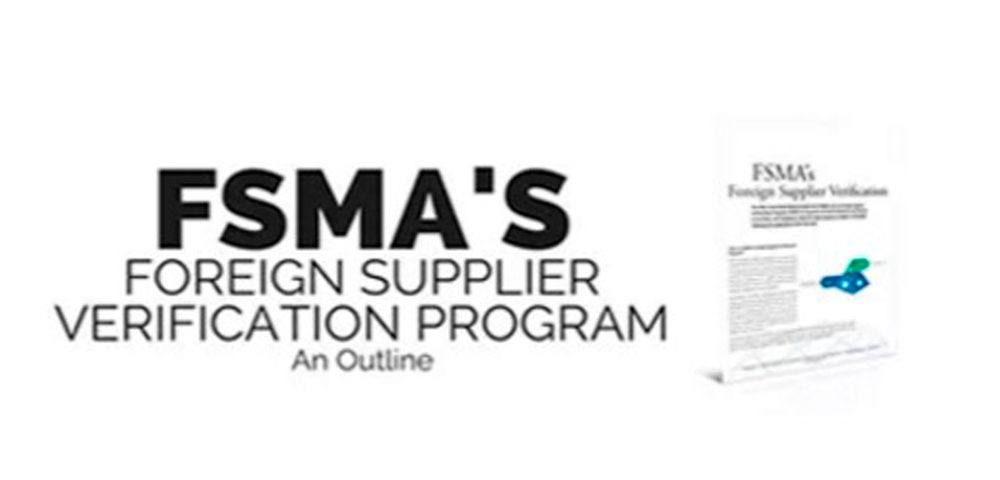FSVP: Creando una cadena de confianza global

La ley de Modernización a la Inocuidad de los Alimentos (FSMA por sus siglas en inglés) de la FDA publicada en 2011, esta progresivamente reconfigurando la inocuidad y calidad de los alimentos en los Estados Unidos. Adicionalmente, los avances tecnológicos alcanzados en sistemas virtuales, tales como el blockchain, están haciendo realidad los sistemas de documentación digital de inicio a fin.
El Programa de Verificación de Proveedores Extranjeros (FSVP por sus siglas en inglés), bajo FSMA, requiere que los importadores aseguren que los alimentos (y el contacto con los alimentos) de los productos que ingresen a los Estados Unidos, cumplan con los requisitos de inocuidad de los alimentos, a través de la verificación. Por definición, “un importador es el propietario o consignatario de un alimento que está siendo importado a los Estados Unidos y vendido en los Estados Unidos). Si no existe un propietario o consignatario, el importador es la agencia o representante en los Estados Unidos al momento de la entrada, como se confirma en una declaración de consentimiento firmada. Como la mayoría de los cambios, existe un periodo de transición de la novedad a la familiaridad. A continuación listamos algunas de las mejores prácticas para asegurar una implementación adecuada y mantenimiento de un programa FSVP como importador.
Responsibility is Shared, Accountability is Owned
Most conventional Hazard Analysis and Critical Control Point (HACCP) systems rely on the expertise of a diverse team bearing skills such as project management, quality assurance, supply chain, testing, and validation. Although food safety is a shared responsibility from a global perspective, it cannot be assumed that every individual on the team perceives the same level of accountability. Once a clear understanding of legal obligations has been set, it is recommended that the most qualified and experienced individual on the team takes the lead on reviewing or developing a food safety plan. From my past experiences with setting up food safety systems for small-scale food importers and distributors, what benefited my clients most was helping them understand how their traceability systems could be further enhanced through supplier verification programs.
Mindful Communication
The FSVP is probably novel to not only certain groups of importers within the U.S., but also to their foreign suppliers as well. When regions like the United Arab Emirates and Singapore initiated requests for proof of food safety systems implementation, such as HACCP, from their foreign suppliers during the mid-2000s, a certain degree of push back from the suppliers was experienced as the concept of documented systems was unfamiliar to them. Being mindful of cultural differences and similarities helps a great deal with both internal and external communications. Take supplier communications one step further by illustrating examples through templates and providing them with a chart for metric conversions. Where feasible, conducting second-party audits helps accelerate the suppliers’ understanding of the FSVP requirements.
Document, Share, and Verify
Written documentation, procedures, and policies often receive more emphasis than the concept of knowledge management. Much more can be achieved beyond a reservoir of documents and templates. Seek legal counsel to ensure the established system’s alignment with the requirements of FSMA. Frequent check-in meetings with the team will ensure transparency and better problem-solving skills. Once documentation steps have been identified and established, ensure all the members of the multi-functional team is aware of its location. In most cases, procurement and finance personnel are often left scrambling for information during the process of vetting suppliers. Before implementing a FSVP, it helps to conduct a risk-based gap analysis in regards to the current and anticipated catalog of products. Alcoholic, juice beverages, and food products that are transshipped through the U.S., are some of the products that are currently exempt from FSVP. Training personnel on good documentation and inspection practices will enable the implemented system to remain homogenous.
Stephen R. Covey, a renowned educator, sums it up nicely, “When the trust account is high, communication is easy, instant, and effective.”
Fuente: www.foodqualityandsafety.com



